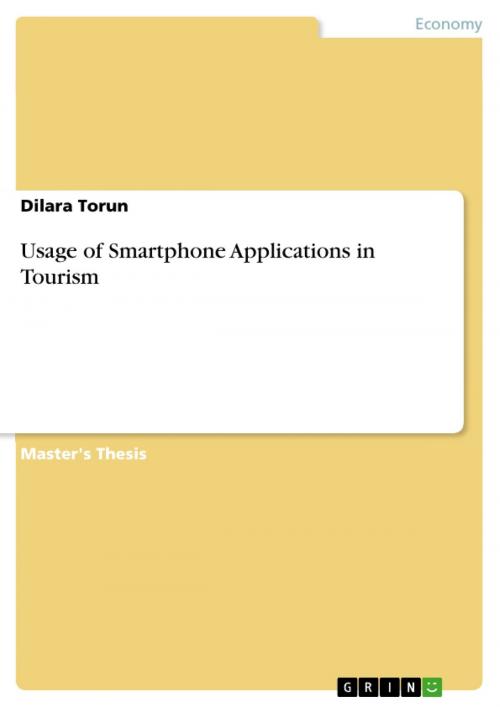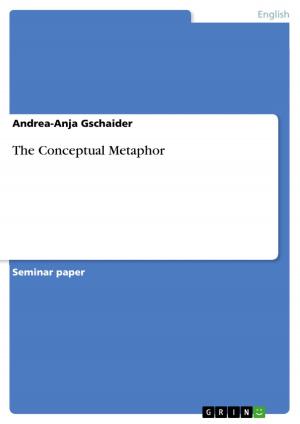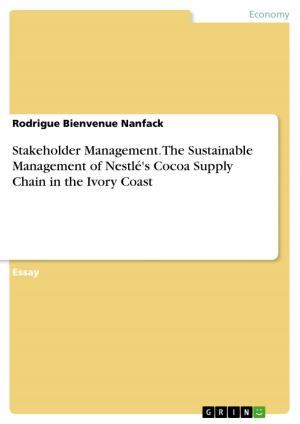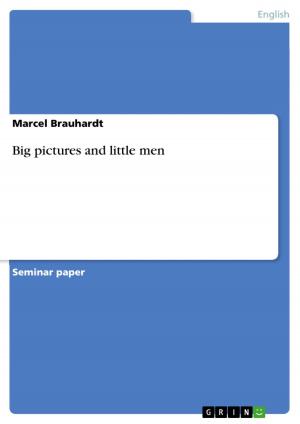Usage of Smartphone Applications in Tourism
Business & Finance, Industries & Professions, Hospitality, Tourism & Travel| Author: | Dilara Torun | ISBN: | 9783656022336 |
| Publisher: | GRIN Publishing | Publication: | October 6, 2011 |
| Imprint: | GRIN Publishing | Language: | English |
| Author: | Dilara Torun |
| ISBN: | 9783656022336 |
| Publisher: | GRIN Publishing |
| Publication: | October 6, 2011 |
| Imprint: | GRIN Publishing |
| Language: | English |
Master's Thesis from the year 2011 in the subject Tourism, grade: 9,7 (of 10) - distinction, Bournemouth University (School of Tourism), course: European Tourism Management, language: English, abstract: In recent years, smartphone applications have appeared as a new tool helping travellers create experiences. Taking into consideration the potential impact of the smartphones and mobile applications, it is important to analyse the usage of smartphone applications in tourism. This dissertation analyses the already existing mobile applications on the tourism market, clarifies which type of consumers uses these applications during their travel process and predicts some future trends for these new mobile services. There are several different user groups who use smartphones in a variety of different ways, from business users to media junkies. The literature review shows that the main customers are young men, who use these applications especially to plan their travel during the information phase. But smartphone applications can not only support tourists' information processing activities such as connection and navigation in the tourism consumption stage, but also the activities in the pre-consumption and post-consumption stages. A survey in Madrid (Spain) and Nuremberg (Germany) was conducted for this dissertation showing the main differences and similarities in using smartphone applications for tourism activities. The usage of smartphones in Germany is still more frequent than in Spain and the main used device is the iPhone from Apple. Furthermore, German as well as Spanish travellers focus their usage mainly on the information stage than on the booking process, as the majority of mobile applications are purely informative such as maps or tourist travel guides. The usage is also still challenged by expensive roaming charges and poor Internet connectivity. For a successful usage tourism companies should therefore focus on aspects like secure and efficient mobile services who give tourists feel like accompanied with a reliable and personal travel guide during their whole trip. Only by improving these aspects, smartphone applications will have a successful growth on the tourism market. Keywords: tourism, smartphone, mobile applications
Master's Thesis from the year 2011 in the subject Tourism, grade: 9,7 (of 10) - distinction, Bournemouth University (School of Tourism), course: European Tourism Management, language: English, abstract: In recent years, smartphone applications have appeared as a new tool helping travellers create experiences. Taking into consideration the potential impact of the smartphones and mobile applications, it is important to analyse the usage of smartphone applications in tourism. This dissertation analyses the already existing mobile applications on the tourism market, clarifies which type of consumers uses these applications during their travel process and predicts some future trends for these new mobile services. There are several different user groups who use smartphones in a variety of different ways, from business users to media junkies. The literature review shows that the main customers are young men, who use these applications especially to plan their travel during the information phase. But smartphone applications can not only support tourists' information processing activities such as connection and navigation in the tourism consumption stage, but also the activities in the pre-consumption and post-consumption stages. A survey in Madrid (Spain) and Nuremberg (Germany) was conducted for this dissertation showing the main differences and similarities in using smartphone applications for tourism activities. The usage of smartphones in Germany is still more frequent than in Spain and the main used device is the iPhone from Apple. Furthermore, German as well as Spanish travellers focus their usage mainly on the information stage than on the booking process, as the majority of mobile applications are purely informative such as maps or tourist travel guides. The usage is also still challenged by expensive roaming charges and poor Internet connectivity. For a successful usage tourism companies should therefore focus on aspects like secure and efficient mobile services who give tourists feel like accompanied with a reliable and personal travel guide during their whole trip. Only by improving these aspects, smartphone applications will have a successful growth on the tourism market. Keywords: tourism, smartphone, mobile applications















